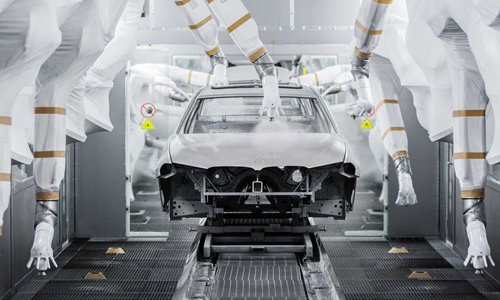BMW China says it aims to support dealers, following claim about pulling out of 'price war'

Undated file photo shows industrial robotic arms paint a car at Dadong Plant of the BMW Brilliance Automotive (BBA) in Shenyang, capital of Northeast China's Liaoning Province. Photo: Xinhua
Following a claim that BMW China will withdraw from the "price war" in the car market, the company said in a statement on Friday that in the second half of 2024, it will focus on the quality of its business in the Chinese market and support dealers to operate steadily.
The response came after a blogger said on social media that due to serious losses caused by the price war, BMW China will stabilize product prices from July to ease the operating pressure on dealers, even if it means a reduction in sales.
According to domestic financial news portal yicai.com, BMW China suddenly sent a letter to all dealers at the end of May, saying that in view of the market background and the huge impact of domestic brands, it would be issuing substantial subsidies and relief policies to 4S stores.
The policies are intended to help dealers overcome short-term difficulties, relieve business pressure, and jointly provide excellent products, services and luxury travel experiences for Chinese consumers, yicai.com reported, citing a person with knowledge of the issue.
In the first half of this year, BMW sold 375,947 vehicles in the Chinese market, including BMW and Mini brands, down 4 percent from the same period last year.
China's total automobile sales reached 14.047 million in the first half, an increase of 6.1 percent year-on-year, according to statistics from the China Association of Automobile Manufacturers.
Analysts said that the price war in the passenger car market has been driven partly by the country's auto trade-in policy, which encourages scrapping of more polluting vehicles and trading up to more fuel-efficient cars or new-energy vehicles (NEVs).
The policy is part of China's plan to encourage large-scale equipment renewal and trade-in of consumer goods. A fixed one-time subsidy of up to 10,000 yuan ($1,379) is available for individuals who scrap vehicles that only reach China's level III emission standard or below.
NEV producers are gaining an increasing share of the market, and this trend will continue in the coming years, industry observers said. This will create fierce competition between newer and older players in the sector, and this process will continue for several years until a new industry landscape is formed.
Global Times

